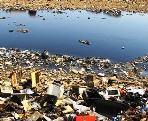Proposition 23, if approved, will halt state regulatory action against greenhouse gas emissions.
In the latest settlement, the city will expand its system to reduce discharges of untreated combined sewage from about 35 per year to four or less.
NIOSH releases its evaluation of potential exposures and health effects of those involved in the Deepwater Horizon response activities.
New York-based Riverkeeper filed a petition to force the creation of federal standards for the disposal of cement kiln dust, which can be harmful to water quality.
Comments on the proposal are due by Dec. 14. The rule will require reduced use of fossil fuel-generated energy in new federal buildings and federal buildings undergoing major renovation.
The agreement will reimburse EPA Superfund more than $4.5 million, resolve nearly $1.2 million in natural resource damages assessment costs, and perform a removal action and restoration project.
The Delaware Superfund site was being cleaned up by Metachem, which declared bankruptcy in 2002, and now EPA is leading the remediation effort.
The Savannah River National Laboratory used the product in a headspace simulation test of disposal of a decontamination agent in a waste package after a predetermined drying and packaging time.
A new label for E15 is being proposed to help ensure consumers use the correct fuel.
Certified Environmental Services, Nicole Copeland, Elisa Dunn and Sandy Allen conspired to aid and abet Clean Air Act violations related to falsifying lab results to prove that asbestos removal was done properly.
The 24-acre New York site was used for scrap metal operations for 40 years, and the soil contains semi-volatile organic compounds and various metals.
The document includes cost information developed from literature sources, manufacturers, and operating facilities.
EPA is inviting stakeholders to participate in listening sessions in Maryland, the District of Columbia, Virginia and Pennsylvania about proposed stormwater regulations.
The plan includes benchmarks to track progress against such priorities as reducing greenhouse gas emissions and protecting America's waters.
North America’s largest lead producer will shut down its Herculaneum lead smelter by Dec. 31, 2013 and provide an initial $8.14 million in financial assurance to guarantee cleanup work.
Offshore drilling, production, workover, and certain onshore facilities are not eligible for the extension.
On the high end, cars will be expected to achieve 60 miles per gallon by the year 2025.
This is the first federal court action brought by the government under the marine diesel engine rules.

Under the Resource Conservation and Recovery Act, the law would add a new category of "restricted electronic waste" that cannot be exported from the United States to developing nations, such as Ghana.
The Bureau of Ocean Energy Management, Regulation and Enforcement, formerly MMS, has developed rules for offshore oil and gas operations in federal waters that require operators to develop and follow a 13-point Safety and Environmental Management System.